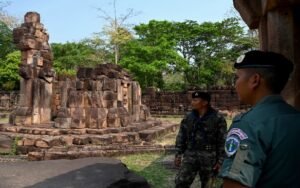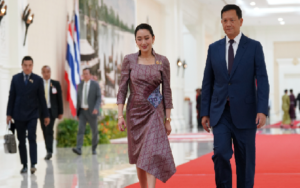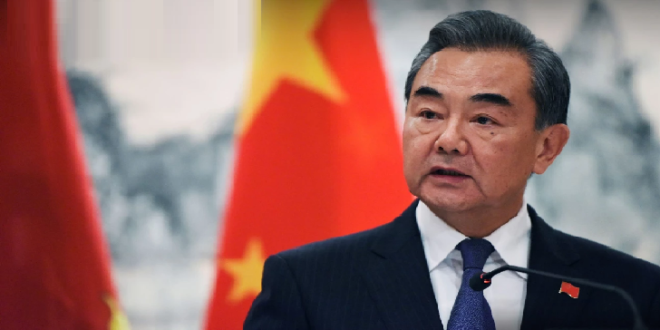13-07-2025
BEIJING/ BANGKOK: China urged Cambodia and Thailand to resolve their border dispute through friendly dialogue, offering to play a constructive role by upholding an “objective and fair” position, its foreign ministry said.
 Foreign Minister Wang Yi urged peaceful coexistence between the neighbors during a meeting on Thursday with Thai counterpart Maris Sangiampongsa on the sidelines of an ASEAN summit in Malaysia, the ministry said in a statement.
Foreign Minister Wang Yi urged peaceful coexistence between the neighbors during a meeting on Thursday with Thai counterpart Maris Sangiampongsa on the sidelines of an ASEAN summit in Malaysia, the ministry said in a statement.
“China is willing to uphold an objective and fair position and play a constructive role for the harmonious coexistence between Thailand and Cambodia,” Wang said.
Tension has risen between the Southeast Asian neighbors since the end of May, after a Cambodian soldier was killed in a brief exchange of gunfire at a disputed area on their 820-km (510-mile) border.
Last month Cambodia asked the International Court of Justice to resolve the disputes.
Wang reiterated China’s impartiality on the border issue in a meeting with Cambodian Foreign Minister Prak Sokhonn the same day, the ministry said in a separate summary.
He emphasized security measures to protect Chinese and Cambodians, calling for tougher action to “completely eradicate the tumor” of cross-border crimes such as online gambling, wire fraud, counterfeiting and smuggling.
Referring to US tariffs, he added that China believed Southeast Asia had the ability to cope with the “complex situation” and safeguard common interests as well as those of individual nations.
Tension has been rising between Thailand and Cambodia following the killing of a Cambodian soldier in May during a brief exchange of gunfire at a disputed border area between the two Southeast Asian neighbors.
 WHERE DOES THE DISPUTE ORIGINATE?
WHERE DOES THE DISPUTE ORIGINATE?
Thailand and Cambodia have for more than a century contested sovereignty at various un-demarcated points along their 817 km (508 miles) land border, which was first mapped by France in 1907 when Cambodia was its colony. That map, which Thailand later contested, was based on an agreement that the border would be demarcated along the natural watershed line between the two countries.
In 2000, the two countries agreed to establish a Joint Border Commission to peacefully address overlapping claims, but little progress has been made towards settling disputes.
Claims over ownership of historical sites have raised nationalist tension between the two countries, notably in 2003 when rioters torched the Thai embassy and Thai businesses in Phnom Penh over an alleged remark by a Thai celebrity questioning jurisdiction over Cambodia’s World Heritage-listed Angkor Wat temple
WHAT WERE PREVIOUS FLASHPOINTS?
An 11th century Hindu temple called Preah Vihear, or Khao Phra Viharn in Thailand, has been at the heart of the dispute for decades, with both Bangkok and Phnom Penh claiming historical ownership. The International Court of Justice awarded the temple to Cambodia in 1962, but Thailand has continued to lay claim to the surrounding land.
WHAT’S BEHIND RECENT TROUBLES?
Despite the historic rivalry, the current governments of Thailand and Cambodia enjoy warm ties, partly due to the close relationship between their influential former leaders, Thailand’s Thaksin Shinawatra and Cambodia’s Hun Sen, whose daughter and son respectively are now the respective prime ministers in their countries. Thaksin and Hun Sen also remain active in politics. (Int’l Monitoring Desk)
 Pressmediaofindia
Pressmediaofindia




